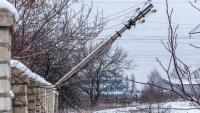Blog / Ukraine in Focus
Ukraine in Focus
In solidarity with Ukraine as the country seeks to defend itself against Russian aggression, and in recognition of the need to amplify the voices of intellectuals from Ukraine and abroad who have engaged deeply with the most pressing issues facing the country, the IWM is launching Ukraine in Focus, a selection of materials from members of the IWM community that will be updated each week, curated by Katherine Younger, Research Director of our Ukraine in European Dialogue Program.
Ukraine in Focus is an initiative of the IWM’s program Ukraine in European Dialogue. Since its creation in 2015, UiED has sought to foster intellectual and cultural exchange between Ukrainians and their counterparts across Europe and North America, through fellowships, events, and publications.
The program is premised on the conviction that Ukrainians have much to contribute to broader intellectual discussion and that understanding the Ukrainian experience, both historically and in the present moment, sheds light on some of the key issues facing the world today.
UiED continues the IWM’s longstanding tradition of solidarity with societies in transition, as well as its long-running engagement with the Ukrainian intellectual sphere. The “Ukraine in Focus” series revives an initiative started in 2014 that was curated by inaugural UiED Research Director Tatiana Zhurzhenko and formed part of Tr@nsit Online, IWM’s former online magazine.
The emphasis here is on newly-published and still-relevant older materials that offer a rich, multifaceted picture of the current situation and of Ukrainian society, rather than coverage of rapidly-developing events. Reliable Ukrainian-run, English-language news sources include the Kyiv Independent, New Voice of Ukraine, and Ukraine World.
Shouting for Ukraine: Displacement, Activism, and Solidarity
Interview: Lizaveta German on Art and Culture in Ukraine
Two Years of Full-Scale War: Taking Stock with Timothy Snyder
Teaching as Resistance: Ukrainian Educators Reflect on Their Role in Wartime
The Tragedy of Kakhovka Reservoir
On Loss, and What Can and Cannot Be Saved
Teaching as Resistance: Ukrainian Educators Reflect on Their Role in Wartime
Interview: Kateryna Ruban on Decolonization in Slavic Studies
Ukrainians Speak Global: In Search of a Common Language
Justice and Accountability for Ukraine
Interview: Volodymyr Kulyk on Language Politics and Identity in Ukraine
Ukraine in Print: Recent Books and Perspectives
The Language of War
The Longest February: One Year of Full-Scale War
The Cure for Generational Trauma
Remembering the Holodomor in Wartime
On Encounters and Bearing Witness
“Ein Zuhause für Europa“
Occupation and De-Occupation
Writing about War, Writing in Wartime
Ukraine’s History, Revisited
Describing Ukrainian Reality
Ukrainian Democracy and Global Asymmetries
A War of Annihilation
Victory, Community, Humanity
Ukrainian History as World History 1917-2017
History and Moral Responsibility
War in the Donbas
Russia's Easter Offensive
After Bucha
Misunderstanding Ukraine
The War in Ukraine and Universal Values: Transcript
The Lives Transformed by War
Through whose eyes?
Ukrainians are consoling us by setting an example of how to live
Sacrifice and Responsibility
Ukrainian Resolve
"Genocide" and Genocide. How Putin's atrocity talk leads to atrocities
